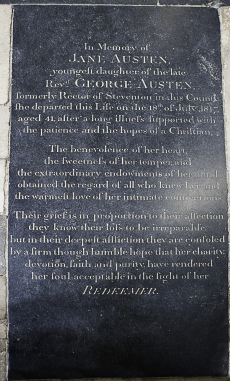
The character of Emma from Austen’s book of the same name, published in 1815 – the same year that the Napoleonic Wars finally ended, is a character which seems to defy the limitations placed on women at the time. In fact the narrator goes as far as to say, tongue-in-cheek, ‘The real evils indeed of Emma’s situation were the power of having rather too much her own way’. The picture this lexis paints is one of a bold woman, the antithesis of the idea that a woman must submit to someone.
Austen cleverly uses Emma as a device to illustrate how class dictates a women’s power in society: ‘A single woman, with a very narrow income, must be a ridiculous, disagreeable, old maid! ...but a single woman, of good fortune is always respectable…’ Austen associates a derogatory lexical field with a woman who is poor, and a complimentary lexical field with one that is rich, reflecting the attitudes of polite society in a tongue-in-cheek manner which reveals such attitudes for what they really are. That being entirely superficial and utterly focused upon a woman’s wealth, rather than, say, a woman’s character. It also goes to show on a baser level how despite the prevailing idea in early nineteenth century society that women are by nature inferior to men, a woman could still be in a better, more influential position than the vast majority of men by being in the right class. Being a man does not ‘always’ make oneself respectable to society, having large amounts of money does.
However, Emma is made the subject of embarrassing male passion when, on the carriage ride home after a gathering Mr Elton, whom Emma is trying to have married off to Miss Harriet, expresses his heartfelt feelings for her: ‘without much apparent diffidence, Mr Elton, the lover of Harriet was professing himself her lover.’ As a woman her fortunes of being ‘handsome, clever, and rich’ paradoxically become a misfortune in a way, because she becomes trapped into being the fancy of many of the men she comes across. In spite of her wealth, Emma is still trapped in the social conventions of her day, which state that she must wait for a man to express their feelings of love to her, rather than initiate any romance herself. This means that, though a woman of high stature and great influence in her community, she has to wait and hope that a man will come along and profess his love for her whom she loves also.
Despite being a woman who enjoys toying with social boundaries, the man she remains closest to is the man who criticises her actions the most: ‘Better to be without sense, than misapply it as you do.’ This derogatory remark Mr Knightley hurls at Emma and other remarks he uses like it are employed to make her realise that using her influence at every chance she has isn’t wise. This is because whilst her influence is great, it becomes clear through the novel that often her judgement is not, in spite of her intelligence. Austen demonstrates via this how power used by both men and women can have negative outcomes.
WyrdLight.com [CC BY-SA 3.0 (http://creativecommons.org/licenses/by-sa/3.0) or CC BY-SA 3.0 (http://creativecommons.org/licenses/by-sa/3.0)], via Wikimedia Commons

0 Comment:
Be the first one to comment on this article.